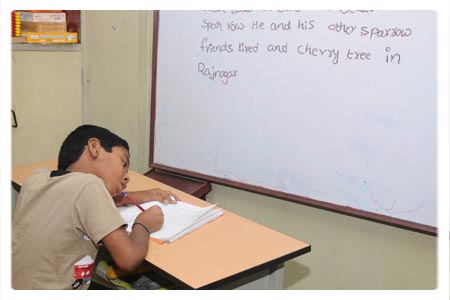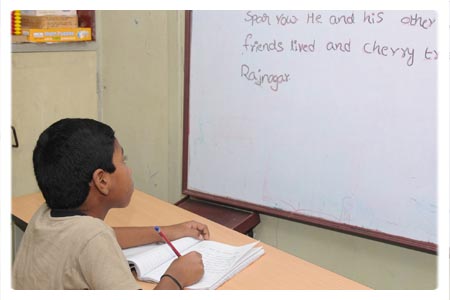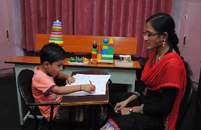Remedial Teaching
Remedial Teaching for slow learners and learning disabilites
Learning disability is a hetrogeneous group of disorders manifested by significant dificulties in the acquisition and use of listening, speaking, reading, writing, reasoning or mathematical abilities.
Some children in regular school can not learn efficiently due to specific breakdown in the learning process involving listening, thinking, perceiving, memory and expresion. Such difficulties are called specific learning disabilities.
Specific Learning disabilities
Each of these specific L.D is generally belived to be caused by an impartment in hervous systems functioning.
1) Dyslexia - Impairment in reading ability
2) Dysgraphia - Writing or forming letters
3) Dysacvsis - Understanding speech and deriving Meaning from speech
4) Diskinesia - Clumsiness or poor co-ordinaiton.
5) Dyscalculia - Impairment in Mathematical ability
6) Dyslogia - Linguistic distrubance characterised by faulty formation or expressiion of verbal ideas.
7) Dysphasia - Impairment to produce or comprehend language either written or spoken
8) Dysnomia - Difficulty in searching for and thinking of a word to express a thought or idea.
9) Dysrthythmia - Poor rhythm or the loss of ability to move with ryhthm.
10) ADHD - (DSM III) An impairment in sustained attention including fidgeting distractibility excessive talking, poor listening skills, difficulty in completing activities and impulsivity, on set before age seven.
 WHAT IS Learning Disability ?
WHAT IS Learning Disability ?
LD is a genetic term that refers to a heterogenious group of
disorders manisfitted by significant difficulties in the acquisition and use of
listening, speaking, reading, writing or reasoning or mathematical abilities
or of social skills. These disorders are intrinsic to the individual may or
maught be caused by disfuntions CNS.
CHARACTERISTICS OF CHILDREN WHO ARE LD?
Reading and related language-based learning disabilities
Signs and Symptoms
- Reads slowly and painfully
- Experiences decoding errors, especially with the order of letters
- Shows wide disparity between listening comprehension and reading comprehension of some text
- Has trouble with spelling
- May have difficulty with handwriting
- Exhibits difficulty recalling known words
- Has difficulty with written language
- May experience difficulty with math computations
- Decoding real words is better than nonsense words
- Substitutes one small sight word for another: a, I, he, the, there, was
Mathematical disability
Signs and Symptoms
- Shows difficulty in understanding concepts of place value, and quantity, number lines, positive and negative value, carrying and borrowing
- Has difficulty in understanding and doing word problems
- Has difficulty in sequencing information or events
- Exhibits difficulty in using steps involved in math operations
- Shows difficulty in understanding fractions
- Is challenged making change and handling money
- Displays difficulty in recognizing patterns when adding, subtracting, multiplying, or dividing
- Has difficulty in putting language to math processes
- Has difficulty in understanding concepts related to time such as days, weeks, months, seasons, quarters, etc.
- Exhibits difficulty in organizing problems on the page, keeping numbers lined up, following through on long division problems
Writing or fine motor skills deficit
Signs and Symptoms
- May have illegible printing and cursive writing (despite appropriate time and attention given the task)
- Shows inconsistencies: mixtures of print and cursive, upper and lower case, or irregular sizes, shapes or slant of letters
- Has unfinished words or letters, omitted words
- Inconsistent spacing between words and letters
- Exhibits strange wrist, body or paper position/li>
- Has difficulty pre-visualizing letter formation
- Copying or writing is slow or labored
- Shows poor spatial planning on paper
- Has cramped or unusual grip/may complain of sore hand

For remedial teaching with special support we are providing the new techniques like reading, writing, problem solving, and math reasoning and math solving problem etc.,
These children need the support of different teaching technquies through playway methods and Individualized Education Program, individual attention and innovative method of remedial teaching with NIOS support.
Assessment test are given in the following seven areas :
1) Basic Reading skills
2) Reading Comprehension
3) Mathematics Calculation
4) Written Expression
5) Oral Expression
6) Listening Comprehension
Learning problem can be due to difficulty in any one or more of the above prceses of learning by which the student is unable to learn to the optinum. Appropriate educational diagnosis and remedial education will assist in improving their learning process.
Assessments available at our institution for L.D and slow learners:
1) Diagnostic Test of Learning Disability (DTLD)
2) Schonell's Reading & Spelling Test
3) Grade Level Assessment Device ( GLAD)
4) Informal Academic Acheivment Test (Maths, English)
The education assessment process at Lahari Rehabilitation Centre
1) We check the child's hearing, vision, motor abilities and refer for assistance if needed.
2) We gather data on emotional, cultural environmental aspects
3) We assess behaviour : Some of the associated characteristics of such children are one or more of the following
- Hyper Activity
- Perceptial Motor Impairment
- Attention Disorder
- Impulsivity
- Disorder of Memory
- Problems in Orientation to time and place
- Disorders of thinking and disorders in speech in addition to poor performance in scholastic areas.
For Remedial teaching with special support our L.D professionals are providing Assessment, Programming using innovative teaching techniques and methods, individualsed / group teaching including N.I.O.S facility.
Strategies we follow at Lahari Rehabilitation Centre
1) We provide active learning experiences to teach concepts to the children
2) We provide ample opportunities for guided practice of new skills
3) We provide multi sensory learning expriences. Students with learning problems some time have sensory processing difficulties include visual, auditory, tactile and kinesthetic modes.
4) We present information in a manner that is relevant to the student.
5) We provide student with concrete illustrations of their progress. (Charts, Graphs, Checksheets)


